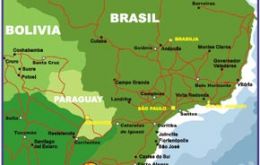MercoPress. South Atlantic News Agency
Economy
-
Saturday, June 27th 2009 - 10:12 UTC
Spain approves 9 billion Euro support fund for banking system

The Spanish cabinet approved Friday a 9 billion Euro (12.7 billion US dollars) fund to help revive the financial sector by buying stakes in banks hit by the global crisis and get them lending again.
-
Friday, June 26th 2009 - 12:59 UTC
Astori’s team looks for support (and funds) from Argentine businessmen

Leaders from the grouping which supports Uruguayan presidential hopeful Danilo Astori cautioned in Buenos Aires that if Senator Jose Mujica is nominated candidate next Sunday, the ruling coalition’s re-election chances could be impaired.
-
Friday, June 26th 2009 - 03:28 UTC
Fearful Argentines taking their dollar savings to Uruguay for shelter

Safe deposit boxes in Uruguay are overflowing with US dollars from fearful Argentines concerned about the situation in their country and the results of Sunday’s mid term elections, according to banking sources in Montevideo.
-
Thursday, June 25th 2009 - 17:27 UTC
Argentina’s industrial production falls for fifth month running

Argentine industrial production fell 1.7% in May from a year earlier and was down 0.2% on the month, according to the latest release from the country’s Statistics Institute. This is the fifth month running that industrial production has been contracting.
-
Thursday, June 25th 2009 - 06:16 UTC
US recession “slowing” but economy is expected to remain weak, says Fed

The United States Federal Reserve kept interest rates unchanged on Wednesday and said that the recession in the US is “slowing” but “economic activity is likely to remain weak for a time”.
-
Wednesday, June 24th 2009 - 08:10 UTC
Uruguayan residents have 7.1 billion US dollars in overseas banks

Uruguayan residents’ savings in overseas banks totalled 7.1 billion US dollars in the last quarter of 2008, which represents a slight drop from September 2008 but 14% over December 2006 (6.25 billion USD) according to the latest report from the Bank of International Settlements, BIS.
-
Wednesday, June 24th 2009 - 05:47 UTC
Uruguay’s imports plummet for the fifth month running, 41% in May

Uruguay’s imports again plummeted in May for the fifth month running, with the highest inter-annual negative rate, 41%, according to the latest data from the Central Bank released this week.
-
Wednesday, June 24th 2009 - 05:43 UTC
World Bank forecasts Uruguayan economy growth of 0.8% in 2009

The World Bank estimates the Uruguayan economy will expand 0.8% this year and begin a gradual recovery in 2010 with growth reaching 2.3%. In spite of the poor 2009 estimate, it will be one of the highest of the region together with Peru, Panama, Bolivia, Belize and Guyana.
-
Tuesday, June 23rd 2009 - 11:22 UTC
Brazilian currency and stock market drop on World Bank forecast

Brazil’s currency, Real fell the most in four months battered by the World Bank’s prediction of a deeper recession in 2009 pushed by investors fleeing higher-yielding, emerging-market assets.
-
Tuesday, June 23rd 2009 - 08:04 UTC
Roubini: risk of double dip recession in advanced economies

The influential economist Nouriel Roubini, who rose to prominence for predicting the global credit crisis, said there is a risk that advanced economies will suffer a double dip recession and pointed out he saw more signs of “yellow weeds” than the green shoots of economic recovery.
